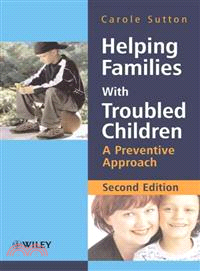Helping Families With Troubled Children - A Preventive Approach 2E
商品資訊
ISBN13:9780470015490
出版社:John Wiley & Sons Inc
作者:Sutton
出版日:2006/04/07
裝訂/頁數:精裝/338頁
定價
:NT$ 8617 元優惠價
:
90 折 7755 元
若需訂購本書,請電洽客服 02-25006600[分機130、131]。
商品簡介
作者簡介
目次
商品簡介
In ‘Helping Families with Troubled Children’ Carole Sutton stresses the importance of attempting to work with families before difficult behaviour becomes entrenched and resistant to intervention, preferably at or before the age of 2 years. Drawing on social learning theory and cognitive behavioural principles, she provides a structured approach to intervention (ASPIRE -Assessment, planning, implementation, review and evaluation) and guides practitioners to work supportively with parents.
Updated with the latest research findings in a number of areas of children’s difficulties, specific chapters address sleep problems, anxiety and depression, eating problems, wetting and soiling, serious behaviour problems and ADHD.
Updated with the latest research findings in a number of areas of children’s difficulties, specific chapters address sleep problems, anxiety and depression, eating problems, wetting and soiling, serious behaviour problems and ADHD.
作者簡介
Carole Sutton is Associate Director of the Unit for Parenting Studies at De Montfort University. She originally worked as a social worker in the fields of health, mental health and children and families, where her experiences as a practitioner and as a parent led to an interest in preventative work to support young families. She studied for a degree in psychology and then for a doctorate in parent education, working with Professor Martin Herbert. She is a chartered psychologist. This book has grown out of her subsequent experiences of teaching and training professional workers, health visitors, social workers in field and residential settings, psychologists, family therapists, teachers and doctors and supporting parents in helping their troubled children.
目次
List of Tables and Figures.
About the Author.
Acknowledgements.
Introduction.
So the grounds for concern are still serious.
The beginnings of a focus upon prevention.
Some common themes emerging from the research.
Dissemination of the necessary skills.
PART I: SOME GENERAL PRINCIPLES FOR HELPING FAMILIES.
1. Research Concerning Troubled Children.
The needs of children.
The nature of children’s difficulties.
The origins of some of the difficulties: risk and protective factors.
The effectiveness of interventions to help children.
2. Social Learning/Cognitive-Behavioural Theory.
Ways of thinking about human beings.
A range of perspectives on human beings.
Exploring principles of cognitive-behavioural theory.
Making use of principles of cognitive-behavioural theory.
Summary of some key principles of cognitive-behavioural theory.
3. Engaging and Supporting Parents and Families.
Children within a statutory and organisational context.
How can we best support families?.
Developing awareness of cultural issues.
Developing a positive focus.
Practice issues: the importance of structure.
Interagency work.
Methods of giving help: evidence from research.
4. ASPIRE – Assessment.
ASPIRE: a process for practice.
What is assessment?.
The steps of assessment – and beyond.
5. ASPIRE – Planning, Implementation, Review and Evaluation.
The stage of planning – with parents or caregivers.
Implementing the plan.
Reviewing and evaluating the plan.
PART II: HELPING FAMILIES WITH SPECIFIC DIFFICULTIES.
6. Helping Families with Children who are Anxious or Depressed.
Definition of emotional disorders.
Prevalence of emotional difficulties in children.
Research into children and anxiety.
Helping families with anxious children.
Research into children and depression.
Helping families with depressed children.
7. Helping Families with Children’s Sleeping Problems.
Definition of sleeping disorder.
Prevalence of sleeping/waking difficulties.
Research into the origins of bedtime and waking.
problems.
Research into the management of bedtime and sleep.
problems.
Helping families whose children have bedtime/waking.
problems.
8. Helping Families with Children with Eating Problems.
Problems of definition.
Prevalence of eating/feeding problems.
Research into the origins of feeding/eating problems.
Research into the management of eating difficulties.
Helping families with children with eating difficulties.
9. Helping Families with Children with Serious Behaviour Problems.
Difficulties of arriving at definitions.
Prevalence of and continuities in conduct disorders.
Research into the origins of conduct disorders.
Research into intervention in conduct disorders.
Helping parents with children with serious behaviour.
problems.
10. Helping Families with Children with Attention Deficit Hyperactivity Disorder.
Difficulties of arriving at definitions and diagnoses.
Prevalence of ADHD.
Research into ADHD.
Research concerning the management of ADHD.
Helping parents with children with features of ADHD.
11. Helping Families Whose Childen Wet or Soil.
Enuresis/bed-wetting: definition and prevalence.
Research concerning the origins of bed-wetting.
Research concerning the management of bed-wetting.
Help for families with children who wet the bed.
Encopresis/soiling.
Research into the origins of soiling.
Research into the management of soiling.
Help for families with children who soil.
12. Parent Education and Training: Values and Research.
The value base of the work: ethical issues.
Support for families in a multicultural society.
The content and process of effective programmes of parent training.
Content and characteristics of effective parent education programmes.
The process an practicalities of parent training.
Devising agreements to support practice.
Maintaining the improvement.
Concluding remarks.
Appendix 1: Form for assessment of child behaviour difficulty.
Appendix 2: Form for recording ‘life events’ for the family and child.
Appendix 3: Form for obtaining ratings on the Life Events Scale.
Appendix 4: Form for compiling summary of information relevant to assessment.
Appendix 5: Form for noting A–B–C sequences.
Appendix 6: Form for charting behaviours.
Appendix 7: Form for eight-week charting of positive and negative behaviours.
Appendix 8: Form for planning with parents.
Appendix 9: Parenting positively: some notes for parents.
Appendix 10: Weekly sleep chart.
Appendix 11: Guidelines for Good Practice of Behavioural and Cognitive Psychotherapy.
Appendix 12: Form for framing an agreement between a worker and a client.
Appendix 13: Form for framing an agreement in one-to-one or family work.
References.
Index.
About the Author.
Acknowledgements.
Introduction.
So the grounds for concern are still serious.
The beginnings of a focus upon prevention.
Some common themes emerging from the research.
Dissemination of the necessary skills.
PART I: SOME GENERAL PRINCIPLES FOR HELPING FAMILIES.
1. Research Concerning Troubled Children.
The needs of children.
The nature of children’s difficulties.
The origins of some of the difficulties: risk and protective factors.
The effectiveness of interventions to help children.
2. Social Learning/Cognitive-Behavioural Theory.
Ways of thinking about human beings.
A range of perspectives on human beings.
Exploring principles of cognitive-behavioural theory.
Making use of principles of cognitive-behavioural theory.
Summary of some key principles of cognitive-behavioural theory.
3. Engaging and Supporting Parents and Families.
Children within a statutory and organisational context.
How can we best support families?.
Developing awareness of cultural issues.
Developing a positive focus.
Practice issues: the importance of structure.
Interagency work.
Methods of giving help: evidence from research.
4. ASPIRE – Assessment.
ASPIRE: a process for practice.
What is assessment?.
The steps of assessment – and beyond.
5. ASPIRE – Planning, Implementation, Review and Evaluation.
The stage of planning – with parents or caregivers.
Implementing the plan.
Reviewing and evaluating the plan.
PART II: HELPING FAMILIES WITH SPECIFIC DIFFICULTIES.
6. Helping Families with Children who are Anxious or Depressed.
Definition of emotional disorders.
Prevalence of emotional difficulties in children.
Research into children and anxiety.
Helping families with anxious children.
Research into children and depression.
Helping families with depressed children.
7. Helping Families with Children’s Sleeping Problems.
Definition of sleeping disorder.
Prevalence of sleeping/waking difficulties.
Research into the origins of bedtime and waking.
problems.
Research into the management of bedtime and sleep.
problems.
Helping families whose children have bedtime/waking.
problems.
8. Helping Families with Children with Eating Problems.
Problems of definition.
Prevalence of eating/feeding problems.
Research into the origins of feeding/eating problems.
Research into the management of eating difficulties.
Helping families with children with eating difficulties.
9. Helping Families with Children with Serious Behaviour Problems.
Difficulties of arriving at definitions.
Prevalence of and continuities in conduct disorders.
Research into the origins of conduct disorders.
Research into intervention in conduct disorders.
Helping parents with children with serious behaviour.
problems.
10. Helping Families with Children with Attention Deficit Hyperactivity Disorder.
Difficulties of arriving at definitions and diagnoses.
Prevalence of ADHD.
Research into ADHD.
Research concerning the management of ADHD.
Helping parents with children with features of ADHD.
11. Helping Families Whose Childen Wet or Soil.
Enuresis/bed-wetting: definition and prevalence.
Research concerning the origins of bed-wetting.
Research concerning the management of bed-wetting.
Help for families with children who wet the bed.
Encopresis/soiling.
Research into the origins of soiling.
Research into the management of soiling.
Help for families with children who soil.
12. Parent Education and Training: Values and Research.
The value base of the work: ethical issues.
Support for families in a multicultural society.
The content and process of effective programmes of parent training.
Content and characteristics of effective parent education programmes.
The process an practicalities of parent training.
Devising agreements to support practice.
Maintaining the improvement.
Concluding remarks.
Appendix 1: Form for assessment of child behaviour difficulty.
Appendix 2: Form for recording ‘life events’ for the family and child.
Appendix 3: Form for obtaining ratings on the Life Events Scale.
Appendix 4: Form for compiling summary of information relevant to assessment.
Appendix 5: Form for noting A–B–C sequences.
Appendix 6: Form for charting behaviours.
Appendix 7: Form for eight-week charting of positive and negative behaviours.
Appendix 8: Form for planning with parents.
Appendix 9: Parenting positively: some notes for parents.
Appendix 10: Weekly sleep chart.
Appendix 11: Guidelines for Good Practice of Behavioural and Cognitive Psychotherapy.
Appendix 12: Form for framing an agreement between a worker and a client.
Appendix 13: Form for framing an agreement in one-to-one or family work.
References.
Index.
主題書展
更多
主題書展
更多書展購物須知
外文書商品之書封,為出版社提供之樣本。實際出貨商品,以出版社所提供之現有版本為主。部份書籍,因出版社供應狀況特殊,匯率將依實際狀況做調整。
無庫存之商品,在您完成訂單程序之後,將以空運的方式為你下單調貨。為了縮短等待的時間,建議您將外文書與其他商品分開下單,以獲得最快的取貨速度,平均調貨時間為1~2個月。
為了保護您的權益,「三民網路書店」提供會員七日商品鑑賞期(收到商品為起始日)。
若要辦理退貨,請在商品鑑賞期內寄回,且商品必須是全新狀態與完整包裝(商品、附件、發票、隨貨贈品等)否則恕不接受退貨。













